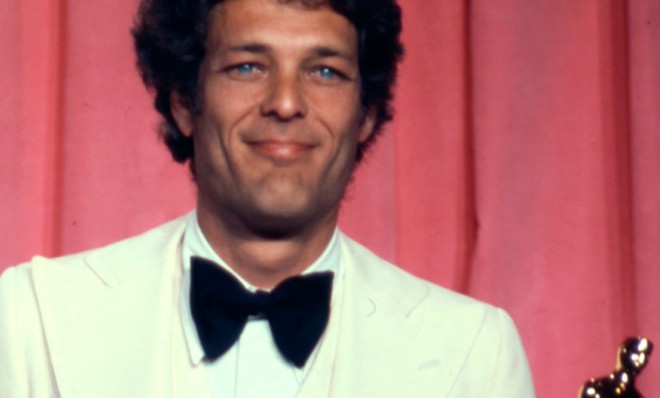5 historical Oscar controversies you probably didn't know about
The annual gala has been a showcase for Communist propaganda and mysterious no-shows

A free daily email with the biggest news stories of the day – and the best features from TheWeek.com
You are now subscribed
Your newsletter sign-up was successful
In the days leading up to Sunday's 85th annual Academy Awards, we're sure to be treated to the highlights — and lowlights — of the previous 84 ceremonies. There was the streaker, Sacheen Littlefeather rejecting an award on Marlon Brando's behalf, Michael Moore's political diatribe, Jack Palance's pushups — really, the list goes on and on. But there are still some outrageous stories and uncomfortable situations that have slipped under the cultural radar. From mega-spoilers to George Bernard Shaw's tantrum, here's a rundown of five Oscar controversies you probably didn't know about:
1. The Brooklyn cabbie who presented an award to Bob Hope
Just recently, a fan made his way onto the stage at the Grammy Awards, setting off a furor over security. Well, the same thing happened in 1962 at the Academy Awards, only worse. While Shelley Winters and Vince Edwards presented the award for Best Cinematography, a Brooklyn cab driver named Stan Berman leapt to the stage and handed Winters a homemade Oscar statue. He then grabbed the microphone and announced, "Ladies and gentlemen, I'm the world's greatest gatecrasher, and I just came here to present Bob Hope with his 1938 trophy." That was a reference to Hope's film The Big Broadcast of 1938, for which he didn't receive an honor.
The Week
Escape your echo chamber. Get the facts behind the news, plus analysis from multiple perspectives.

Sign up for The Week's Free Newsletters
From our morning news briefing to a weekly Good News Newsletter, get the best of The Week delivered directly to your inbox.
From our morning news briefing to a weekly Good News Newsletter, get the best of The Week delivered directly to your inbox.
2. The director who spouted "Communist propaganda"
During the 1975 ceremonies, when debate over the Vietnam War was still raging, documentary filmmaker Bert Schneider used his acceptance speech to read a telegram from a Viet Cong diplomat offering "greetings of friendship" to the American people. Angry responses from viewers began to pour in objecting to the "Communist propaganda," and producers had to think fast. They sent host Frank Sinatra out with a statement saying that the Academy was not responsible for any political statements made during the show. Fellow host Shirley MacLaine was not pleased with the statement, which was reportedly the brainchild of Bob Hope, yet another host for the evening. MacLaine believed that the disclaimer made it seem as if the Academy had taken a right-wing position on the Vietnam issue.
3. The worst spoiler ever
Few people know who will win Best Picture on Sunday, but that wasn't always the case. From the start of the Awards in 1928, winners were actually announced to the press ahead of time. That changed in 1940 when attendees arriving at the gala were upset to discover that people were already talking about how Gone With The Wind had won eight awards. The Academy didn't issue these spoilers to ruin the fun: They did it to help the press cover the event and meet their deadlines. Actors and others were supposed to be kept in the dark, but one reporter was so excited about the Gone With The Wind results that he reportedly cracked and disclosed the Academy's biggest secret of the night. Word spread quickly from there.
A free daily email with the biggest news stories of the day – and the best features from TheWeek.com
4. The curious case of the non-existent screenwriter
When Robert Rich won for Best Original Story for The Brave One in 1957, nobody came up to accept the award. That's because Rich was really Dalton Trumbo, who had been blacklisted by the Academy for his alleged Communist connections. The Academy eventually eased up on Trumbo, paving the way for him to use his real name again in Hollywood. But Trumbo didn't come forward as the man behind "Robert Rich" until 1976, when he finally retrieved his award. In 1993, he was posthumously awarded the Academy Award for writing 1953's Roman Holiday; that one went to Ian McLellan Hunter, a real screenwriter who acted as a front for Trumbo in this case.
5. George Bernard Shaw's fit of pique
Talk about being ungrateful. In 1939, legendary playwright George Bernard Shaw was awarded for his screenplay for the movie version of Pygmalion. But Shaw didn't take it well — in fact, he wasn't on hand to receive it. From England, he reportedly said, "It's perfect nonsense! To offer me an award of this sort is an insult, as if they had never heard of me before — and it's very likely they never had." The Oscar eventually found its way to Shaw's residence overseas, but when Shaw died in 1950, his statuette was found to be in such bad shape that the curator tasked with turning his home into a museum used Oscar as a doorstop. Eventually, the statuette was repaired and is now displayed prominently at the museum.
Danny Groner is the manager of blogger partnerships & outreach for Shutterstock. He is also a freelance writer who was once described by a blogger as "a walking Wikipedia."
-
 Corruption: The spy sheikh and the president
Corruption: The spy sheikh and the presidentFeature Trump is at the center of another scandal
-
 Putin’s shadow war
Putin’s shadow warFeature The Kremlin is waging a campaign of sabotage and subversion against Ukraine’s allies in the West
-
 Media: Why did Bezos gut ‘The Washington Post’?
Media: Why did Bezos gut ‘The Washington Post’?Feature Possibilities include to curry favor with Trump or to try to end financial losses